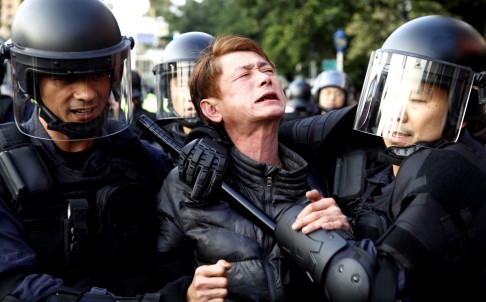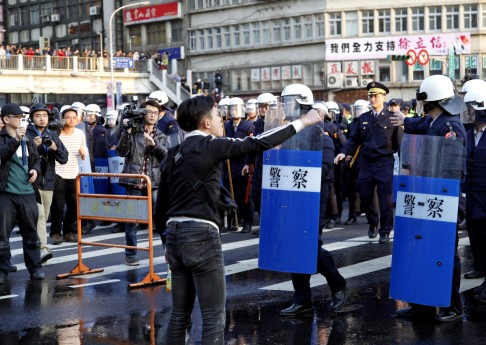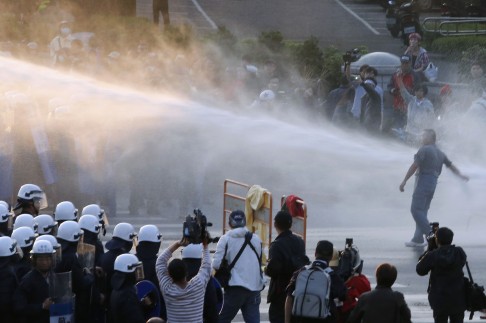Economists blame Taiwan protests on fears of Beijing 'annexation'
Fear a bigger factor than the contents of contentious trade pact itself, they say
PUBLISHED : Monday, 24 March, 2014, 7:38pm
UPDATED : Monday, 24 March, 2014, 7:38pm
Lawrence Chung and Patrick Boehler

Riot police detain a protester near the Cabinet compound in Taipei after an attempt by protesters to seize the government headquarters. Photo: EPA
Economics experts blame escalating Taiwan protests on fears of the island being placed increasingly under Beijing's grip and losing jobs to mainlanders, as the stand-off over the trade deal continues.
They said suspicions over hushed negotiations for the pact also fuelled the protests. “Most of their fears seem to be less directly related to the economics of the pact,” said Christopher Balding, an economics professor at the Peking University HSBC School of Business in Shenzhen.
“There is this fear in Taiwan that they are being quietly annexed by China,” he said.
A spokesman for Taiwan’s economic affairs ministry, Du Zijun, had defended the pact in a lengthy statement on Sunday, rebutting the most widely circulated critiques.
Du stressed the pact would not lead to an increased influx of mainland migrants, but only of approved investors. The overall labour market would remain closed to mainland workers.

A young man taunts riot police as they disperse protesters from the Cabinet compound in Taipei, Taiwan. Photo: EPA
The pact would allow the mainland to invest in 64 service sectors in Taiwan, including advertising, retail and medical services. Mainland businesses with more than US$200,000 in capital would be able to send workers to Taiwan on renewable visas.
“The pact allows for Chinese investors to bring white-collar managers, that may take away jobs [from the] Taiwanese. But this will lead to more employment overall,” said economist Jiong Gong, an economist at the University of International Business and Economics in Beijing.
Gong noted that the mainland has allowed Taiwanese investment in the same service sectors for years. “There has to be reciprocity at some point,” he said.
The ministry also said national security would not be affected by mainland investment. It argued that mainland companies still faced restrictions when entering telecommunications and real estate.
The ministry cited foreign-owned beauty salons in Taiwan which had not wiped out local competition.
However, local service industry representatives were not convinced.
Chu Po-lin, chairman of the Chinese Herbal Medicine Business Union Association in Taiwan, said: “If the trade service pact takes effect, it will result in cutthroat competition from the mainland, which will result in a chain reaction [that will] seriously hurt local service sectors.”

Police use a water cannon to disperse a demonstrator during a protest against a trade pact with mainland China. Photo: Reuters
Shih Hui-tzu, a research fellow at the Chung-hua Institution for Economic Research in Taipei, argued that the opposition was less against the concept of free trade with Beijing, but against the Kuomintang government’s lack of proper consultation.
The ministry statement on Sunday also denied criticism that negotiations with the mainland occurred “within a black box”. More than 100 meetings with professional associations and public hearings have been held, it said.
“Even if they did hold hearings, they were never really interested in what was said,” Shih said.
Balding, the professor, conceded that the protest movement caught many people by surprise, both in speed and vociferousness, echoing the sentiment of other economists.
Gong said the anger at the trade pact reflected an ideological stance against the mainland more than opposition to freer trade in goods.
“Taiwan has to be global to survive in this age of global competition,” he said. “People with strong ideological viewpoints may think differently. It’s an unstoppable trend.”
The agreement builds on the Economic Co-operation Framework Agreement from 2010, which already reduced tariffs on the trade of goods.
The mainland is the island’s largest trading partner. Last year, Taiwan recorded a trade surplus of US$76.2 billion with the mainland and Hong Kong, according to data by the island’s Ministry of Finance.
